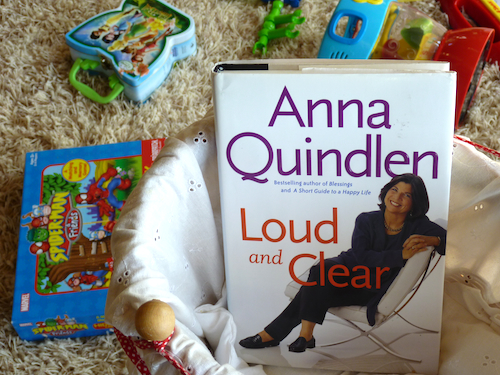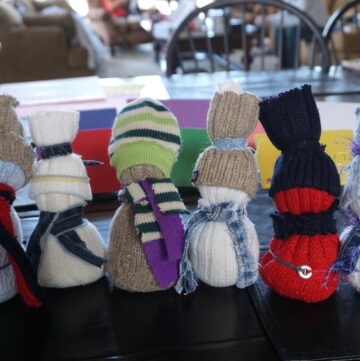Today’s brain food is about the sisterhood of moms – the sisterhood that knows the wondrous joy and dark lows, the fog-headed sleeplessness, the constant company of little people in the bathroom, the desperate need for Five Minutes of Silence, Please.
For those of us who have made it through the trial by fire of new parenthood and come out the other side, today’s readings by the brilliant Anna Quindlen are a poignant reminder of all that we’ve been through and all that we have to look forward to. For those who are in the early days of their transition to parenthood, this is a message to say there is an older and wiser life in your future, and it doesn’t take 18 years to get there.
I was in a restaurant this summer when a couple and their baby – probably seven months old – were seated at the next table. The parents looked like zombies. They spent the meal in dull silence, while their lively baby looked around curiously at the surrounding diners, occasionally pausing to take in a spoonful of baby food. It was like seeing the Ghost of Christmas Past – the ghost of my past – and I remembered the first time my husband and I took our newborn son out for dinner.
It had probably taken us an hour to get out the door, with the requisite rounds of poop changing, wet wardrobe changing and baby gear checking that are part of the new parent hazing program. By the time we got to the restaurant and sat down, no doubt we looked as dazed as the parents I saw this summer.
Nearby was a mom, dad and two older kids finishing their meal. As they passed our table on their way out, the mom stopped suddenly, put her hand on the table, and said to us with a kind smile, “It gets better.” I’m sure we looked completely confused. “The first year is the hardest. It gets a lot easier.” She gestured at her children. “And then it really does go by fast.” We smiled and nodded, but at the time we thought it was kind of strange.
Now I understand that the woman was extending her hand in the sisterhood of moms, and I appreciate her words as heartfelt empathy from one who has been there.
I treasure these two essays by Anna Quindlen, novelist and former columnist for the New York Times and Newsweek. You may have seen the first essay, “Goodbye Dr. Spock,” which has been justifiably well circulated – though often in abbreviated form – since it was originally published in Newsweek, November 2000. It is also the opening piece in Quindlen’s book, Loud and Clear, a collection of her wonderful and incisive essays. “Goodbye, Dr. Spock” is a poignant look back on raising children by a mom whose kids are grown, and its a piece I come back to again and again.
The second essay, “Playing God on No Sleep,” published in Newsweek in 2001, is about the dark side of motherhood. Quindlen wrote the essay after Texas mom Andrea Yates, who had suffered postpartum depression for years, tragically drowned her five young children. I find Quindlen’s words on the issue brave, sensitive and wise.
I’m including the full text of “Goodbye Dr. Spock” here, as Newsweek.com no longer has the full text available on its site, and most references I’ve seen for it online are not the full version. Between Amazon.com and Google Books, you can piece together the full essay online, but to make it easier for you I’ve included it complete here.
Newsweek.com does still have “Playing God on No Sleep” in its archives, so I’m including an excerpt with the the link to the full article below.
1. “Good-bye Dr. Spock,” Anna Quindlen, Newsweek, November 2000
If not for the photographs I might have a hard time believing they ever existed. The pensive infant with the swipe of dark bangs and the black button eyes of a Raggedy Andy doll. The placid baby with the yellow ringlets and the high piping voice. The sturdy toddler with the lower lip that curled into an apostrophe above her chin.
All my babies are gone now. I say this not in sorrow but in disbelief. I take great satisfaction in what I have today: three almost adults, two taller than me, one closing in fast. Three people who read the same books I do and have learned not to be afraid of disagreeing with me in their opinion of them, who sometimes tell vulgar jokes that make me laugh until I choke and cry, who need razor blades and shower gel and privacy, who want to keep their doors closed more than I like. Who, miraculously, go to the bathroom, zip up their jackets, and move food from plate to mouth all by themselves. Like the trick soap I bought for the bathroom with a rubber ducky at its center, the baby is buried deep within each, barely discernible except through the unreliable haze of the past.
Everything in all the books i once pored over is finished for me now. Penelope Leach. Berry Brazelton. Dr. Spock. The ones on sibling rivalry and sleeping through the night and early childhood education, all grown obsolete. Along with Goodnight Moon and Where the Wild Things Are, they are battered, spotted, well used. But I suspect that if you flipped the pages, dust would rise like memories.
What those books taught me, finally, and what the women on the playground taught me, and the well-meaning relations and the older parents at cocktail parties – what they taught me was that they couldn’t really teach me very much at all. Raising children is presented at first as a true-false test, then becomes multiple choice, until finally, far along, you realize that it is an endless essay. No one knows anything. One child responds well to positive reinforcement, another can only be managed with a stern voice and a time-out. One boy is toilet trained at three, his brother at two. When my first child was born, parents were told to put baby to bed on his belly so that he would not choke on his own spit-up. By the time my last arrived, babies were put down on their backs because of research on sudden infant death syndrome.
As a new parent this ever-shifting certainty is terrifying, and then soothing. Eventually you must learn to trust yourself. Eventually the research will follow. First science told us they were insensate blobs. But we thought they were looking, and watching, and learning, even when they spent so much time hitting themselves in the face. And eventually science said that we were right, that important cognitive function began in early babyhood. First science said they should be put on a feeding schedule. But sometimes they seemed hungry in two hours, sometimes three, sometimes all the time, so that we never even bothered to button up. And eventually science said that that was right, and that they would best be fed on demand. First science said environment was the great shaper of human nature. But it certainly seemed as though those babies had distinct personalities, some contemplative, some gregarious, some crabby. And eventually science said that was right, too, and that they were hardwired exactly as we had suspected.
Still, the temptation to defer to the experts was huge. The literate parent, who approaches everything – cooking, decorating, life – as though there was a paper due or an exam scheduled is in particular peril when the kids arrive. How silly it all seems now, obsessing about language acquisition and physical milestones, riding the waves of normal, gifted, hyperactive, all those labels that reduced individuality to a series of cubbyholes. But I could not help myself. I had watched my mother casually raise five children born over ten years, but by watching her I intuitively knew that I was engaged in the greatest – and potentially most catastrophic – task of my life. I knew that there were mothers who had worried with good reason, that there were children who would have great challenges to meet. We were lucky; ours were not among them. Nothing horrible or astonishing happened. There was hernia surgery, some stitches, a broken arm and a fuchsia cast to go with it.
Mostly ours were the ordinary everyday terrors and miracles of raising a child, and our children’s challenges the old familiar ones of learning to live as themselves in the world. The trick was to get past my fears, my ego, and my inadequacies to help them do that. During my first pregnancy I picked up a set of lovely old clothbound books at a flea market. Published in 1933, they were called Mother’s Encyclopedia, and one volume described what a mother needs to be: “psychologically good: sound, wholesome, healthy, unafraid, able to deal with the world and to live in this particular age, an integrated personality, an adjusted person.” In a word, yow.
It is good that we know so much more now, know that mothers need not be perfect to be successful. But some of what we learn is as pernicious as that daunting description, calculated to make us feel like failures ever single day. I remember fifteen years ago poring over one of Dr. Brazelton’s wonderful books on child development, in which he describes three different sorts of infants: average, quiet, and active. I was looking for a sub-quiet codicil (see: slug) for an eighteen-month-old who did not walk. Was there something wrong with his fat little legs? Was there something wrong with his tiny little mind? Was he developmentally delayed, physically challenged? Was I insane? Last year he went to China. Next year he goes to college. He can walk just fine. He can walk too well. Every part of raising children at some point comes down to this: Be careful what you wish for.
Every part of raising children is humbling, too. Believe me, mistakes were made. They have all been enshrined in the “Remember When Mom Did” Hall of Fame. The outbursts, the temper tantrums, the bad language – mine, not theirs. The times the baby fell off the bed. The times I arrived late for preschool pickup. The nightmare sleepover. The horrible summer camp. The day when the youngest came barreling out of the classroom with a 98 on her geography test, and I responded, “What did you get wrong?” (She insisted I include that.) The time I ordered food at the McDonald’s drive-through speaker and then drove away without picking it up from the window. (They all insisted I include that.) I did not allow them to watch The Simpsons for the first two seasons. What was I thinking?
But the biggest mistake I made is one that most of us make while doing this. I did not live in the moment enough. This is particularly clear now that the moment is gone, captured only in photographs. There is one picture of the three of them sitting in the grass on a quilt in the shadow of the swing set on a summer day, ages six, four, and one. And I wish I could remember what we ate, and what we talked about, and how they sounded, and how they looked when they slept that night. I wish I had not been in such a hurry to get on to the next thing: dinner, bath, book, bed. I wish I had treasured the doing a little more and the getting it done a little less.
Even today I’m not sure what worked and what didn’t, what was me and what was simply life. How much influence did I really have over the personality of the former baby who cried only when we gave parties and who today, as a teenager, still dislikes socializing and crowds? When they were very small I suppose I thought someday they would become who they were because of what I’d done. Now I suspect they simply grew into their true selves because they demanded in a thousand ways that I back off and let them be.
There was babbling I forgot to do, stimulation they never got, foods I meant to introduce and never got around to introducing. If a black-and-white mobile really increases depth perception and early exposure to classical music increases the likelihood of perfect pitch, I blew it. The books said to be relaxed and I was often tense, matter-of-fact, and I was sometimes over-the-top. And look how it all turned out. I wound up with the three people I like best in the world, who have done more than anyone to excavate my essential humanity. That’s what the books never told me. I was bound and determined to learn from the experts. It just took me a while to figure out who the experts were.
2. “Playing God on No Sleep,” by Anna Quindlen, Newsweek, 2 July 2001
So a woman walks into a pediatrician’s office. She’s tired, she’s hot and she’s been up all night throwing sheets into the washer because the smaller of her two boys has projectile vomiting so severe it looks like a special effect from “The Exorcist.” Oh, and she’s nauseated, too, because since she already has two kids under the age of 5 it made perfect sense to have another, and she’s four months pregnant. In the doctor’s waiting room, which sounds like a cross between an orchestra tuning loudly and a 747 taking off, there is a cross-stitched sampler on the wall. It says GOD COULD NOT BE EVERYWHERE SO HE MADE MOTHERS.
This is not a joke, and that is not the punch line. Or maybe it is. The woman was me, the sampler real, and the sentiments it evoked were unforgettable: incredulity, disgust and that out-of-body feeling that is the corollary of sleep deprivation and adrenaline rush, with a soupcon of shoulder barf thrown in. I kept reliving this moment, and others like it, as I read with horrified fascination the story of Andrea Yates, a onetime nurse suffering from postpartum depression who apparently spent a recent morning drowning her five children in the bathtub. There is a part of my mind that imagines the baby, her starfish hands pink beneath the water, or the biggest boy fighting back, all wiry arms and legs, and then veers sharply away, aghast, appalled.
But there’s another part of my mind, the part that remembers the end of a day in which the milk spilled phone rang one cried another hit a fever rose the medicine gone the car sputtered another cried the cable out “Sesame Street” gone all cried stomach upset full diaper no more diapers Mommy I want water Mommy my throat hurts Mommy I don’t feel good. Every mother I’ve asked about the Yates case has the same reaction. She’s appalled; she’s aghast. And then she gets this look. And the look says that at some forbidden level she understands. The looks says that there are two very different kinds of horror here. There is the unimaginable idea of the killings. And then there is the entirely imaginable idea of going quietly bonkers in the house with five kids under the age of 7.
Full text of “Playing God on No Sleep,” Anna Quindlen, Newsweek, 2 July 2001 at Newsweek.com






Share back